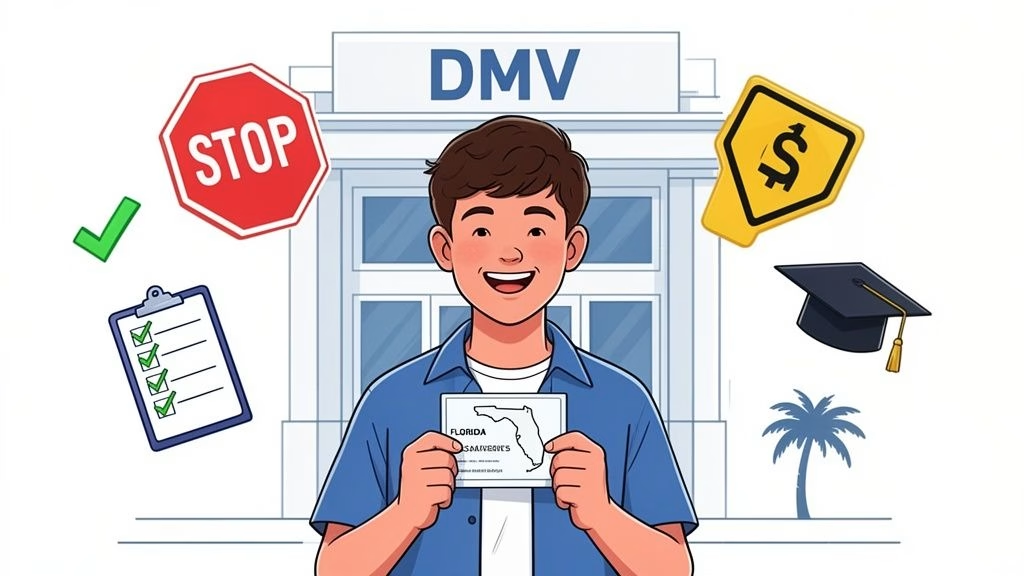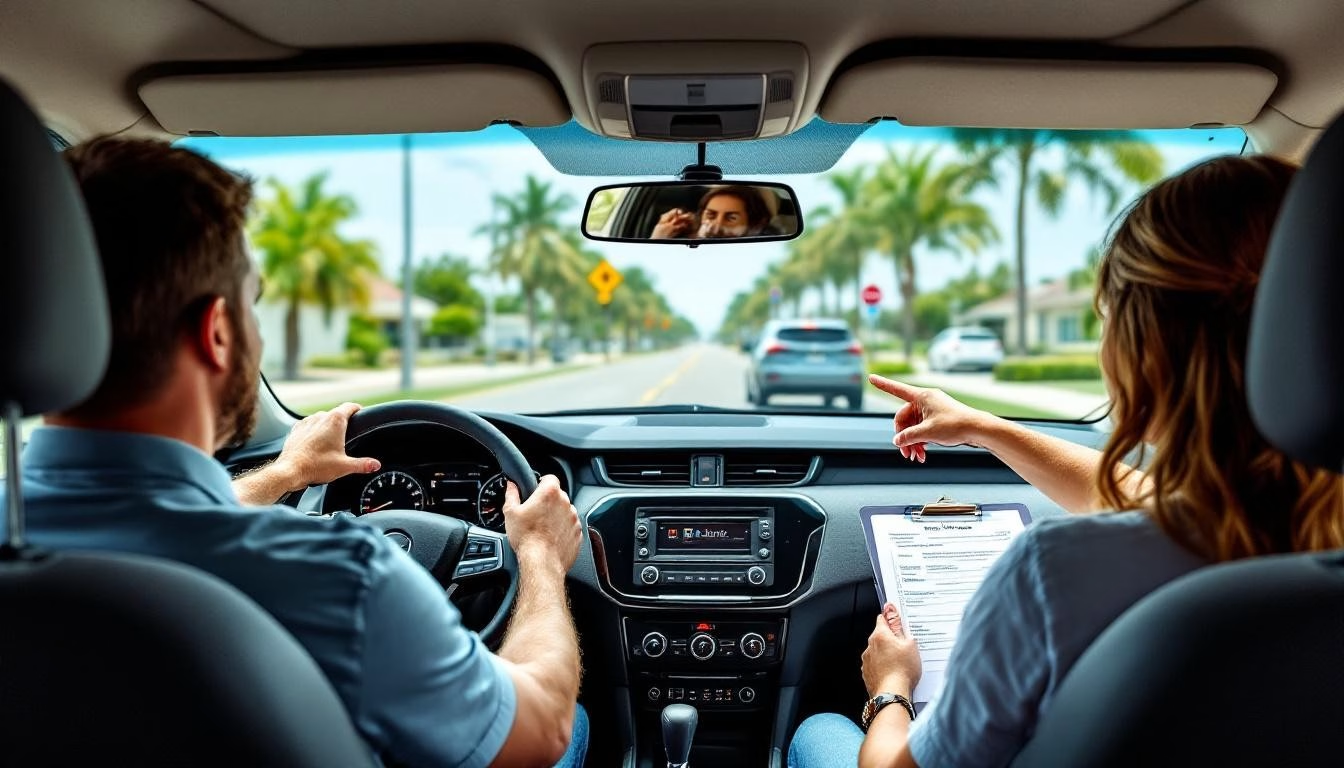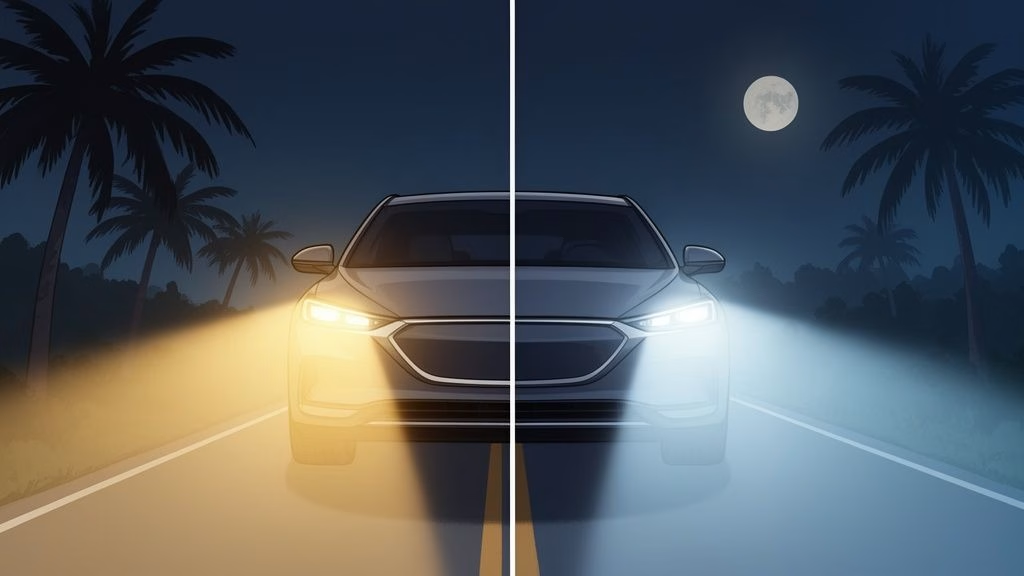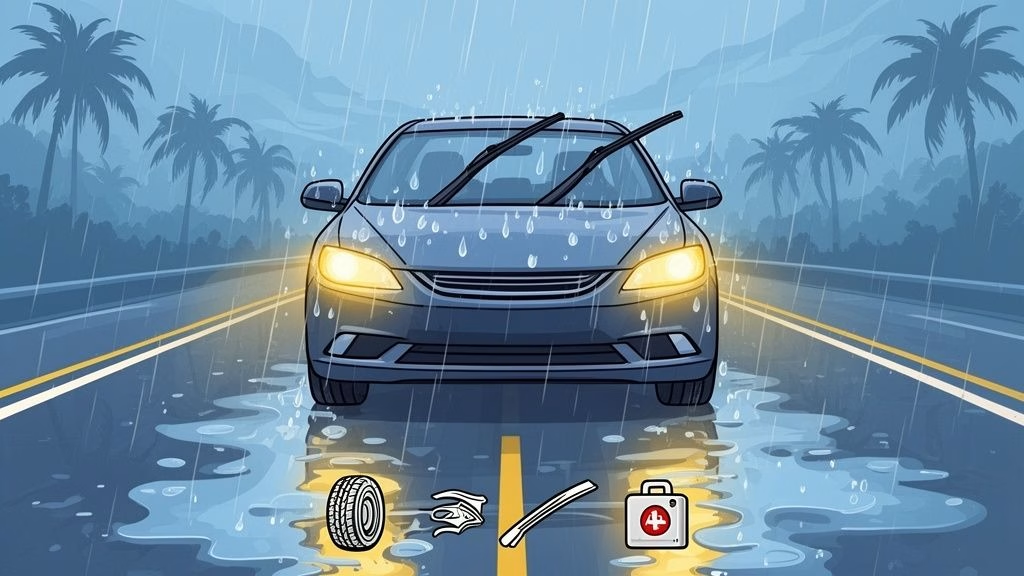Learning to drive as an adult presents unique opportunities and challenges that differ significantly from teenage driver education. Many adults seek behind the wheel driving lessons for adults due to career changes, relocations, or simply overcoming long-held anxieties about driving.
We at floridanewdriver.com understand that adult learners bring valuable life experience and maturity to the driving process. Professional instruction tailored specifically for adults can accelerate learning and build lasting confidence on the road.
What Drives Adults to Start Learning Later
Professional life transitions create the strongest motivation for adult lessons. Adults aged 26 and older typically require supervised driving hours across all stages and conditions, with formal driver education being just one component of their learning process, according to data from the National Highway Traffic Safety Administration. Career advancement often demands relocation to areas with limited public transportation, which makes personal vehicle operation essential for job performance and daily commutes.
Geographic Shifts Change Transportation Needs
Urban professionals who move to suburban areas face immediate mobility challenges. Public transportation networks that once provided reliable city access become sparse or nonexistent in suburban communities. Adults who relocate from cities like New York or San Francisco to suburban markets often experience their first real need for personal vehicle operation. The Insurance Institute for Highway Safety notes that adults bring superior spatial awareness and decision-making abilities to instruction, which makes their transition more efficient than teenage learners.
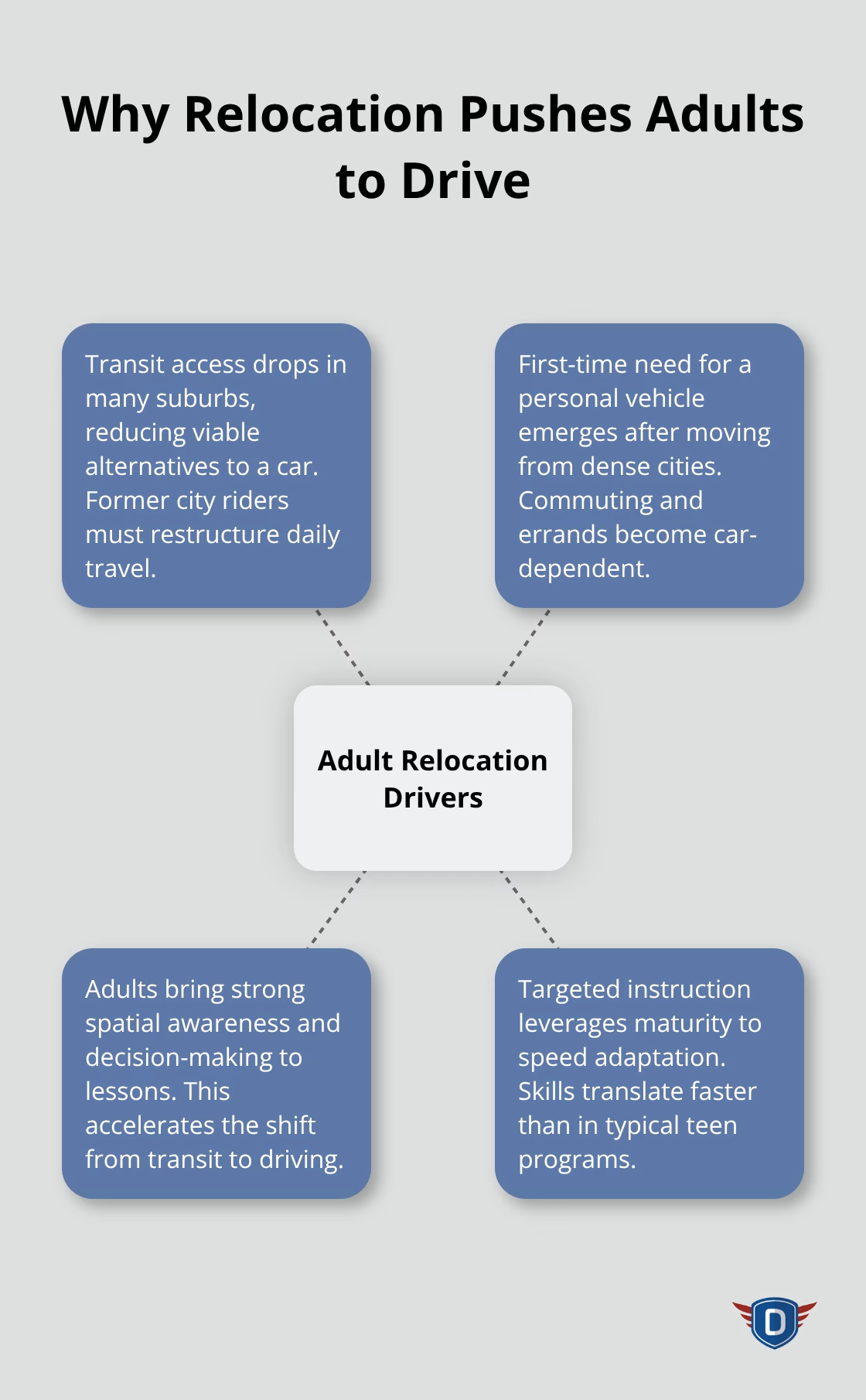
Anxiety Creates Long-Term Avoidance Patterns
Anxiety affects millions of adults who avoided lessons during their teenage years. Past negative experiences, health issues, or major life changes contribute to phobias that persist into adulthood. Research shows that consistent practice with professional instructors breaks avoidance cycles more effectively than self-directed attempts. Adults who experience anxiety benefit from controlled exposure to stressful situations, breathing techniques, and positive reinforcement methods that address specific fears rather than general skills.
Life Changes Demand New Skills
Major life events often trigger the need for adult instruction. Marriage, divorce, or the death of a spouse can suddenly shift transportation responsibilities. Parents who previously relied on partners for family transportation find themselves needing independent mobility (especially for school pickups and medical appointments). Career changes that require travel to multiple locations throughout the day make personal vehicle operation a professional necessity rather than a convenience. Many adults also benefit from refresher courses to update their skills after extended periods without driving.
These varied motivations shape how adults approach their education, which differs significantly from traditional teenage programs.
How Adult Driving Lessons Actually Work
Adult instruction begins with a comprehensive evaluation that examines current skills, anxiety triggers, and specific goals. Professional instructors spend the first session to identify knowledge gaps and comfort levels rather than jump into vehicle operation. Adults who have avoided operation for years often possess theoretical knowledge but lack practical application, while others may have developed unsafe habits that require systematic correction. Driver training programs require structured approaches, with adults typically needing professional instruction to develop safe driving habits and proper vehicle operation skills.
Assessment Shapes Your Path Forward
Initial evaluations reveal specific areas that need attention, from basic vehicle controls to complex traffic navigation. Adults typically excel at traffic law comprehension and safety concepts but struggle with multitasking behind the wheel. Instructors test spatial awareness, reaction times, and comfort levels in various scenarios to create targeted lesson plans. Adults who relocated from urban areas often need highway practice, while those with anxiety require gradual exposure to stressful situations. Professional assessment identifies these needs within the first hour, which allows instructors to focus on practical skills rather than generic curriculum.
Adult Methods Accelerate Progress
One-on-one instruction accommodates adult preferences that differ dramatically from teenage approaches. Adults process information analytically and prefer to understand the reasoning behind safety rules rather than memorize procedures. Instructors explain vehicle dynamics, traffic flow patterns, and defensive strategies that appeal to mature cognitive abilities. Adults also benefit from immediate feedback and error correction during practice sessions. Training programs improve driving skills across all road user groups with moderate to large effects, particularly when lessons connect to real-world scenarios they will encounter (such as school pickup routes or workplace commutes).
Flexible Schedules Remove Barriers
Professional schools offer evening and weekend sessions that accommodate work schedules and family responsibilities. Adults need consistent practice but cannot commit to traditional daytime schedules that suit teenage learners. Many schools provide intensive weekend packages or extended evening sessions that maximize efficiency.
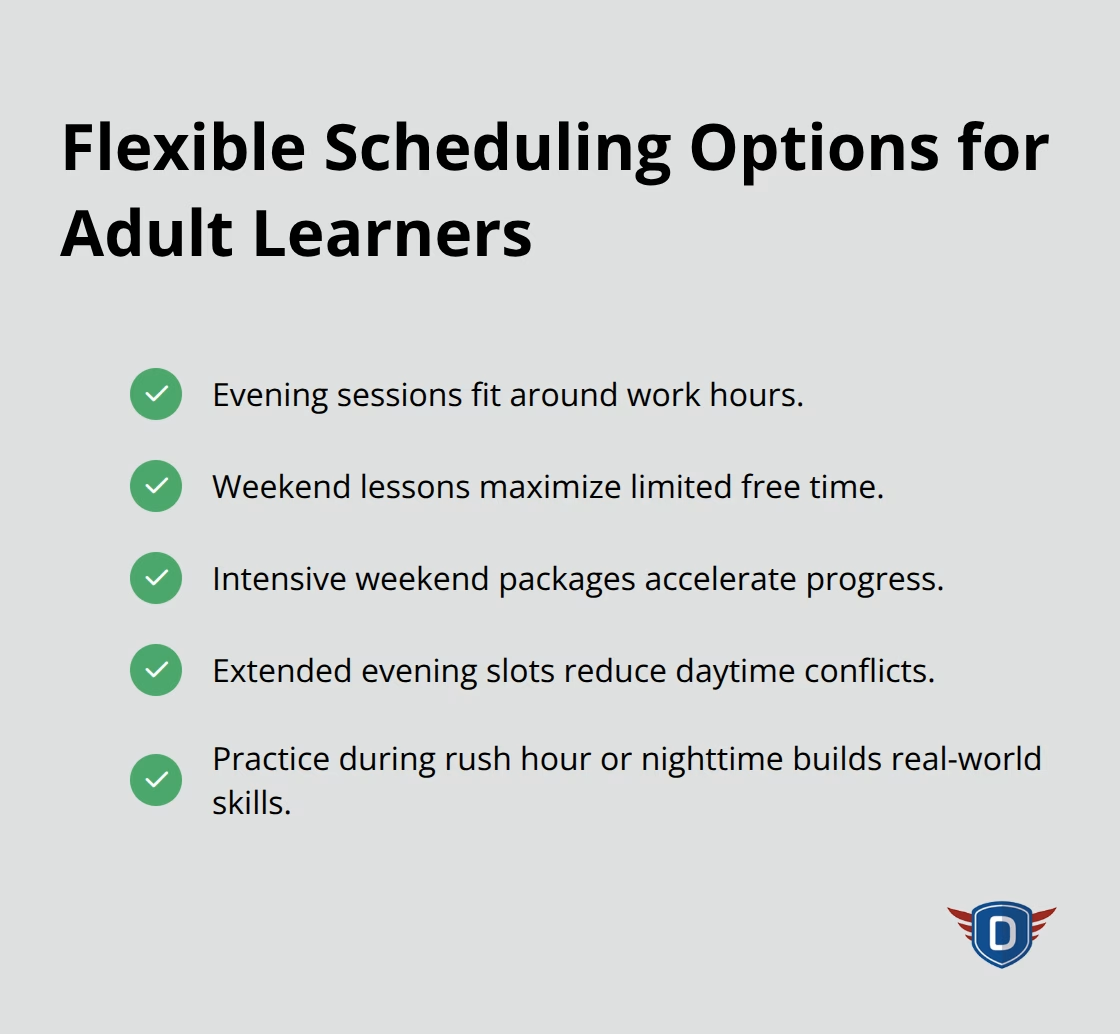
Flexible options also allow adults to practice specific skills during times when they will actually drive, such as rush hour navigation or nighttime visibility challenges.
These structured approaches create a foundation that differs significantly from traditional teenage education programs in several important ways.
Why Adult Drivers Learn Faster Than Teens
Adult learners complete programs in significantly fewer sessions than teenagers, with most adults needing 20-30 hours compared to the 40-50 hours that teen drivers typically require according to the National Highway Traffic Safety Administration. This dramatic difference stems from cognitive maturity and life experience that accelerates skill acquisition. Adults process complex traffic situations more effectively because they already understand risk assessment, consequences, and systematic problem-solving from other areas of life. The Insurance Institute for Highway Safety reports that adult crash rates remain substantially lower than teen rates even during the learning phase, which demonstrates superior judgment from the start.
Adult Brains Process Risk Differently
Adults enter instruction with fully developed prefrontal cortexes, which means they can evaluate multiple hazards simultaneously and make calculated decisions under pressure. Teen drivers have crash rates nearly 4 times those of drivers 20 and older per mile driven, largely due to immature risk assessment capabilities. Adults naturally apply defensive techniques because they understand long-term consequences of accidents (including financial costs, injury recovery, and career disruption). Professional instructors report that adults ask more strategic questions about traffic patterns and hazard recognition rather than focus solely on mechanical vehicle operation. This cognitive advantage translates into faster mastery of complex skills like highway merging, intersection navigation, and adverse weather responses.
Insurance Companies Reward Adult New Drivers
New adult drivers typically pay 15-25% less for coverage than teen drivers, even without history, because actuarial data shows dramatically lower claim frequencies. Insurance providers recognize that adults bring mature decision-making to vehicle operation, which reduces their risk exposure. Many companies offer additional discounts for adults who complete formal driver education programs, with savings that range from 5-15% on annual premiums.
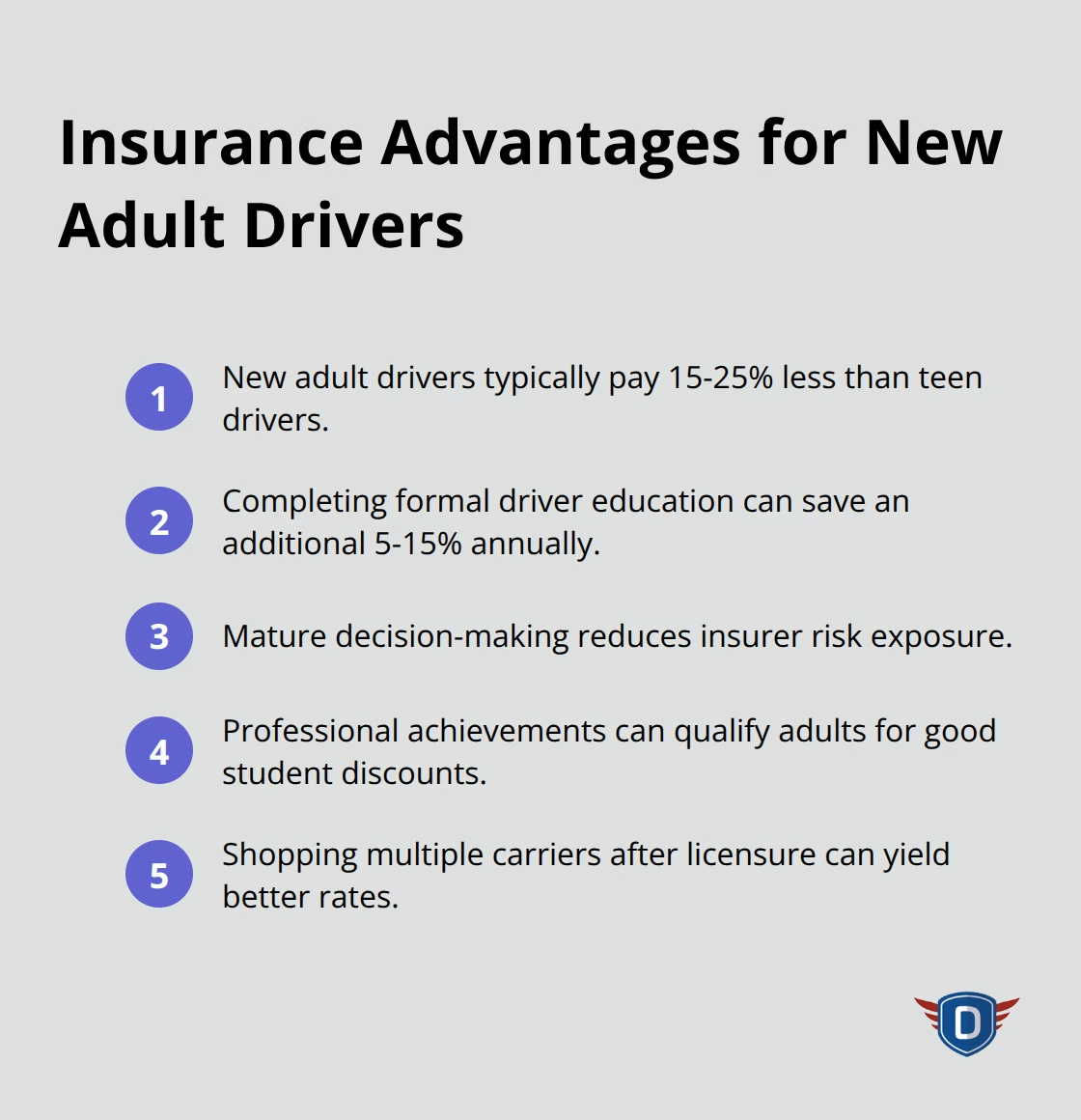
Adults also qualify for good student discounts based on professional achievements and stable employment history (benefits unavailable to teenage learners). Smart adults leverage these advantages by shopping multiple carriers immediately after licensure, since rates vary significantly between companies for new adult drivers.
Experience Transfers to Vehicle Operation
Adults apply problem-solving skills from professional and personal experiences directly to vehicle operation. They understand systems thinking from workplace environments, which helps them grasp traffic flow patterns and anticipate other drivers’ actions. Adults also possess better emotional regulation than teenagers, which prevents road rage incidents and aggressive responses to traffic frustrations. Professional instructors note that adults connect safety concepts to real-world scenarios more effectively than younger students who lack comparable life experience.
Final Thoughts
Professional behind the wheel driving lessons for adults deliver measurable advantages that extend far beyond basic vehicle operation. Adults who complete structured programs demonstrate superior hazard recognition, maintain lower accident rates, and develop defensive techniques that protect them throughout their careers. The combination of mature cognitive abilities and expert instruction creates confident drivers who understand both mechanical skills and strategic road navigation.
Adult learners benefit from personalized approaches that address specific anxieties while they build practical competencies. Professional instructors provide immediate feedback and systematic skill development that self-taught methods cannot match. Adults who invest in quality instruction also gain insurance discounts and reduced liability exposure that offset program costs within the first year of licensed operation (often saving 15-25% on premiums).
Adults who start their education journey need schools that understand mature preferences and offer flexible schedules. We at floridanewdriver.com connect you with certified instructors who specialize in adult driver education programs. Our platform helps you find supportive environments where adults master necessary skills while they develop lifelong safe habits that protect both themselves and other road users.


